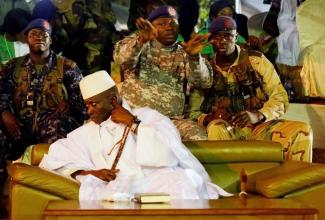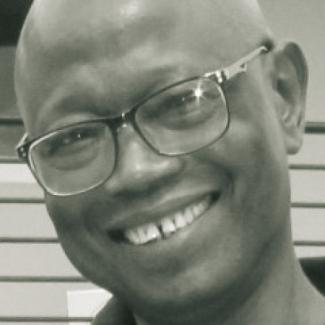Transition from dictatorship
Learning lessons of the past in Gambia

Gambia’s National Assembly enacted the bill to establish the TRRC on 25 November 2017. The Commission started public hearings in January 2019 and submitted its final report with recommendations to President Adama Barrow in November 2021. It was a small, but nonetheless momentous ceremony at State House.
One month later, and in line with the demands of the TRRC Act, the government published the report on 24 December. In May 2022, it released its response in a white paper. For victims, their families and many other people in Gambia and beyond, it contained good news. The government accepted all but two of the commission’s 275 recommendations.
The two proposals it rejected concerned personal issues of an officer of the intelligence agency and ten judges from other West African countries. They were of minor relevance. That was similarly true a few months later, when the government decided against the amnesty of an army officer, who, according to the TRRC, had shown remorse and proved cooperative. That was also true of a further rejection some months later.
The most popular recommendations were to prosecute culprits for crimes against humanity. That obviously applies to Yahya Jammeh, the country’s former dictator who is now living in Equatorial Guinea. It also applies to his closest associates. Three members of his death squad, which was called “the Junglers”, are currently facing criminal charges in the USA, Switzerland and Germany under the principle of universal jurisdiction, according to which a court must not have jurisdiction over the place where crimes against humanity were perpetrated to start legal proceedings against perpetrators. It is therefore widely expected that even if Gambia does not move to prosecute Jammeh, universal jurisdiction will catch up with him someday and he will face prosecution in another country.
Important constitutional and cultural reforms
The prospect of taking a former head of state to court excites the public. Other recommendations, however, are no less important. The transformative mission of a truth commission depends on constitutional and cultural reforms that empower citizens and make government institutions accountable. Citizens must become able to speak up and thwart any attempts to violate fundamental rights.
The TRRC thus recommended reforms to prevent office holders from abusing their power and violating human rights. Other recommendations concern civic education, reconciliation and social cohesion, as well as reparations to victims.
The TRRC was established in fulfilment of an election campaign promise made by Barrow when he ran as a coalition candidate against the ousted dictator in 2016. The nation had suffered 22 years of brutal dictatorship. There had been many cases of torture, extrajudicial killings and forced disappearances – and there were many related rumours. Many Gambians wanted to know the truth, so Barrow’s promise to create a truth-seeking mechanism was appealing. People also appreciated that he acted fast after taking office as president.
Typical objections
Nonetheless, it was not all smooth sailing. A small but critical mass of Gambians raised concerns. Some argued that the crimes of the former regime were well known, so perpetrators should simply be arrested and charged before a court of law. Some accused the government of using the truth commission as a smokescreen behind which they wanted to dodge more urgent responsibilities. Yet others insisted that since there had been no armed conflict in the country, the truth commission was a money-making venture for those involved and would not achieve anything. The TRRC was accused of being a witch-hunting exercise, and some refused to participate, insisting that Yahya Jammeh did not commit any crimes.
Objections of this kind are typically expressed whenever a truth commission is established. They serve the obvious purpose of shielding the perpetrators. Nonetheless, they must be taken seriously.
More generally speaking, the history of truth commissions in many countries warrants some scepticism regarding effectiveness. From Latin America to Asia and Africa, truth commissions have come and gone, guzzling millions of dollars in public funds, but ultimately leaving little positive impact on the societies concerned.
There are exceptions, of course, but by and large, the governments did not respond to the commissions’ work sufficiently. All too often, truth commissions operated well, but government authorities later ignored, downplayed or even refused to publish their final reports and recommendations. Where governments lose interest in transitional justice, they jeopardise the transition itself.
How to transform a culture in a short time
In Gambia, this risk was considered from the start. The people who ran the TRRC wanted to ensure it would become a transformative effort. The idea was to change the country’s civic culture in a way to make dictatorship, political impunity and gross human-rights violations inconceivable in the future. However, the TRRC only had a short mandate for achieving its goals.
The historical context of the country indicates that certain socio-cultural factors enabled Jammeh’s dictatorship. The despot obviously relied on his secret police, the National Intelligence Agency and his death squad. However, the silence and seeming acceptance of the brutality resulted from the country’s civic culture, especially the wide-spread belief that the government is a God-ordained institution. To most Gambians, opposing the king-like Jammeh thus felt like opposing God.
A truth commission cannot tease such issues out if it only focuses on individual cases of brutal repression. The TRRC therefore challenged the medieval notion of an all-powerful, infallible monarch and emphasised principles of a modern nation state with separate branches of government and inalienable rights of all citizens.
It also did what it could to involve the public, making sure to avoid shortcomings of previous commissions in other countries (see box). The strategy worked out well. Gambian society has changed in a profound way. Police brutality and power abuses have not ended, unfortunately, but they now regularly trigger protests. A culture of civic defiance has taken root, especially in urban areas, where traditional attitudes are not as strong as in the hinterland.
Baba G. Jallow is the former executive secretary of the Gambian Truth, Reconciliation and Reparations Commission (TRRC).
gallehb@gmail.com
